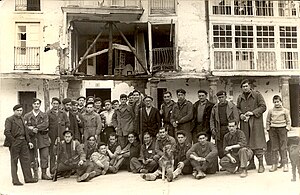Biscay Campaign
| Biscay Campaign | |||||||
|---|---|---|---|---|---|---|---|
| Part of the Spanish Civil War | |||||||
 A group of gudaris (Basque soldiers) in Elgeta, 1937. |
|||||||
|
|||||||
| Belligerents | |||||||
|
|
|
||||||
| Commanders and leaders | |||||||
|
|
|
||||||
| Strength | |||||||
| Thomas:40,000 men 55,000 140 guns 25-30 aircraft two destroyers three submarines |
65,000 200 guns 150 aircraft one battleship two cruisers one destroyer |
||||||
| Casualties and losses | |||||||
| 35,000 casualties (10,000 dead) | 30,000 casualties (4,500 dead) | ||||||
The Biscay Campaign (Spanish: Campaña de Vizcaya) was an offensive of the Spanish Civil War which lasted from 31 March to 1 July 1937. 50,000 men of the Eusko Gudarostea met 65,000 men of the insurgent forces. After heavy combats the Nationalist forces with a crushing material superiority managed to occupy the city of Bilbao and the Biscay province.
By late October 1936, all Gipuzkoa was occupied by the rightist rebel forces. The western front settled at the foot of Intxorta (Elgeta). However, Mola did not hide his plans to use air force against Basque territory loyal to the Republic. Despite Basque nationalist attempts at guaranteeing no shelling on civilians, Spanish Nationalist aircraft raided Bilbao on September 25 and 26, an indiscriminate attack on its starving population that spread a blaze of outrage across the city.
Oblivious to foreseeable consequences, the Nationalists resumed ferocious air strikes against the city on 4 January 1937, prompting yet another outcry of indignation and an assault on the prison-ships where right-wingers were being held. It resulted in a death toll of 224.
On 22 March 1937, Franco decided to halt his offensive against Madrid and start an offensive against the northern Republican held zone. The northern zone was politically divided and isolated from the central Republican zone. Furthermore, there was most of Spanish iron and coal and the chemical plants of Biscay. The Nationalists decided to start the occupation of the northern Republican zone with the conquest of the Biscay province.
The Nationalists had the Emilio Mola's Army of the North (55,000 men). The Nationalist attack started with the Navarrese Division, led by the General José Solchaga. This division had four brigades led by the Colonels Garcia Valiño, Alonso Vega, Cayuela and Latorre (18,000 men) and the Black Arrow division (8,000 men with Italian officers). This force was established between Vergara and Villareal, on the border of the Biscay province. The Nationalist had also 200 guns, 120 aircraft, the battleship España, the cruisers Canarias and Almirante Cervera and the destroyer Velasco.
...
Wikipedia
